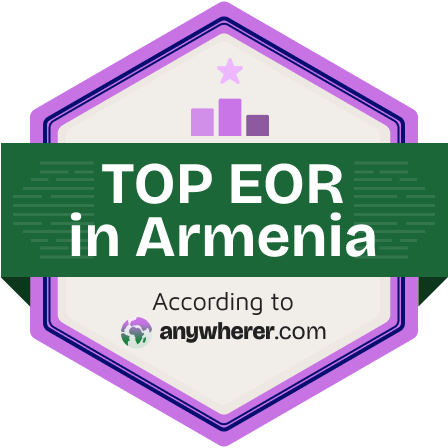Outstaffing, EOR (Employer of Record), Outsourcing, and Staff Leasing
Tanger has been operating in the Armenian labor market since 2000 and, starting from 2005, became the first company in Armenia to offer professional outstaffing, outsourcing, and EOR (Employer of Record) services, including HR solutions, staff leasing, and global contractor hiring.
As an Employer of Record in Armenia, Tanger enables international and local businesses to legally hire employees and contractors without opening a local entity, ensuring full compliance with labor and tax regulations.
Due to economic and organizational efficiency, large companies often prefer to reduce their official headcount and transfer HR responsibilities to professional providers like Tanger. Since 2005, Tanger has delivered trusted EOR and outstaffing services to foreign and international companies operating in Armenia.
What is Outstaffing and EOR (Employer of Record)?
In management theory, outstaffing is a model aimed at reducing administrative overhead and investment risk. Similarly, the EOR model allows companies to legally employ staff through a third-party provider, who becomes the official employer.
This approach is beneficial when companies wish to:
-
Scale operations without expanding their internal HR teams,
-
Hire or relocate talent quickly across regions,
-
Comply with local employment laws and tax regulations,
-
Focus on core business functions while HR, payroll, and compliance are managed externally.
By using Tanger’s Employer of Record (EOR) service, clients retain control over day-to-day tasks and project supervision, while Tanger handles all employment formalities.
Why Use EOR / Outstaffing Services?
You may need EOR (Employer of Record) or outstaffing services when your company:
-
Faces headcount restrictions,
-
Aims to reduce in-house staff without losing key talent,
-
Plans regional hiring without setting up a local office,
-
Needs to hire personnel for specific short or long-term projects,
-
Wants to minimize the burden of HR administration and payroll management,
-
Seeks a compliant solution for dealing with local tax and labor inspections,
-
Is interested in hiring probationary employees without full employment contracts,
-
Intends to maintain small business status while expanding operations,
-
Prefers to delegate part of the legal responsibilities regarding employment.
Tanger’s Role as an Employer of Record
As your EOR provider in Armenia, Tanger becomes the official employer of record for your selected staff and handles:
-
Onboarding and registering employees in compliance with local labor laws,
-
Full HR and back-office management,
-
Payroll processing and benefits administration,
-
Income tax and social contributions reporting and remittance,
-
Paid leave and sick leave accounting,
-
Employee documentation and reference management,
-
Communication with Armenian labor authorities and government institutions.
Flexible Pricing and Additional Support
Tanger’s fee for EOR / Outstaffing services is based on:
-
Number of employees,
-
Average compensation per person,
-
Complexity and scope of network management,
-
Any additional services requested.
Optional EOR Support Services
In addition to the core Employer of Record responsibilities, Tanger also offers:
-
Medical and life insurance coverage,
-
Support for business travel arrangements,
-
Catering service or meal allowance administration,
-
Cell phone and transportation allowance management,
-
Uniform supply and staff training coordination.
Ready to Expand in Armenia with a Trusted EOR Partner?
Tanger simplifies your entry into the Armenian market by acting as your local Employer of Record (EOR). You gain full legal hiring capacity without opening a legal entity, all while remaining focused on growing your core business.
